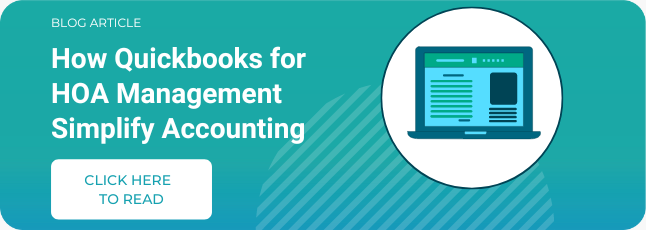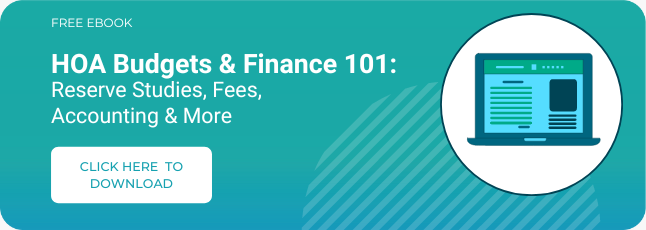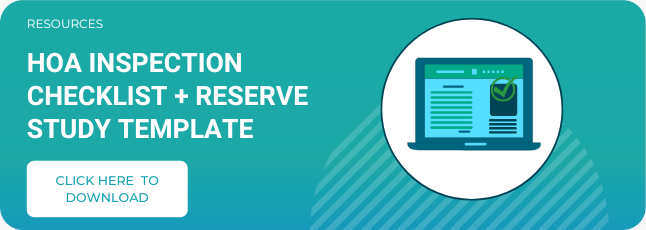To run a successful community, you need to manage your HOA finance accurately. For many communities, this is easier said than done. Sometimes, board members lack the knowledge and tools to efficiently manage their HOA’s funds.
With this in mind, we prepared an article that covers all aspects of HOA finances as well as shares best practices. This article will go over key principles. If you want more in-depth information, make sure to download our free ebook at the end of the article.
1. The role of an HOA Treasurer
A homeowners association (HOA) is governed by a board of directors. Each member of this group has a different role. In this case, the person responsible for overseeing the finances of the community is an HOA Treasurer.
Their main responsibilities are:
- Preparing the HOA annual budget
- Monitoring payments, dues, assessments, and delinquencies
- Facilitating reserve studies and audits frequently
The HOA treasurer sometimes has to work with external vendors and professionals. The community may decide to hire a CPA (Certified Public Accountant) to help them during tax seasons. In this case, the treasurer can act as the intermediary between the board and external auditors.
Best practice: Develop your financial skills and keep up with regulations
In most cases, HOA treasurers struggle in their jobs either because they use outdated processes or because they don’t have the necessary skills. Developing your skills will help you to stay relevant.
The best way to improve your abilities is to learn continuously and to keep up with trends, and changes in regulations.
You can do that by watching Continuing Education Classes like the one below or by reading blog articles and ebooks.
We organize webinars monthly for community associations. Some are CE Classes and some aren’t, but they all cover useful and relevant topics. . Click here to learn more about our webinars.
2. Collecting and Tracking HOA fees
In general, all members of a homeowners association have to pay regular HOA fees to cover the maintenance costs of common areas. Residents pay these dues on a monthly, quarterly, or annually basis. It is the responsibility of the HOA board to collect these payments and budget them properly.
The amount HOA residents pay varies depending on the size of the property and the number of amenities available.
It is essential to have a strict fees collection process to ensure all residents pay on time. If residents don’t pay it can increase delinquencies and it can result in a budget deficit.
Best Practice: Tracking HOA dues online
The best way to avoid losing track of payments is to digitalize the process. Nowadays, a lot of platforms allow you to track payments and information automatically. You can also easily generate invoices that you can share via a link to your residents. Another great functionality is the ability to send reminders when the due date is coming. This saves you time and it reduces the risk of nonpayment.
3. Avoiding HOA Special Assessments
Sometimes, the money collected via HOA fees is not enough to cover all the HOA’s property expenses. In this case, the board of directors can levy an HOA special assessment.
This means that all residents will have to pay an extra amount to cover the exceeding costs. For obvious reasons, this is a situation that no one wants to experience. Special assessments can be a burden for residents who struggle financially. It is often a source of conflicts and misunderstandings between the board and the residents. When special assessments are becoming too frequent, there is probably poor financial management. In this case, it would be better to reassess the HOA fees and to ask for help from financial professionals, such as an accountant or manager.
Best Practice: Preparing for unforeseen events and running inspections
While an HOA special assessment may be the result of poor management it is sometimes a situation that you simply can’t avoid. Some events such as natural disasters can damage your property and repair costs can get very high. The only thing you can do is prepare for it as much as you can. Especially if you live in an area prone to natural disasters.
One way to proceed is to inspect your common areas frequently. By doing this you can quickly spot any potential problem.
Make sure to take pictures of your property so in case something breaks because of a natural disaster you have proof to show to your insurance company.
4. Preparing a successful HOA budget
Preparing, debating, and approving an HOA budget represents a lot of work. Not only for the HOA treasurer but for the whole community as well. As an HOA is run democratically, residents must be aware of the spending. It is essential for everyone to participate in budget meetings and share their opinion. Many times, residents don’t fully understand why fees increase and what the board does with their money. This can create confusion and mistrust. This is why it is crucial to efficiently communicate with your community.
Preparing the annual budget is a laborious process that sometimes involves many stakeholders.
Best Practice: Taking a collaborative approach and holding HOA budget meetings online
Preparing the HOA budget should be a collaborative process. As an HOA treasurer, you need to find ways to engage board members and residents. If your community hires the services of a management company, you should also involve the property manager.
You can do that by gathering frequently. The best way to ensure everyone can participate is by holding online or hybrid meetings. Sometimes, residents are on the go and can’t participate in HOA meetings. Some may be too tired to leave home after a day of work. Whatever the reasons, giving the opportunity to attend a meeting online can increase attendance. It also makes it easier for the management company or the accountant to participate without having to come to your HOA.
5. Streamlining your HOA accounting processes
Apart from preparing the budget, the board is also responsible for the HOA’s accounting. This means they need to record and report every financial transaction. As this process is a bit more technical, some HOAs prefer to hire a certified public accountant to do it.
The main tasks usually include:
- Record transactions in the balance sheets
- Prepare tax returns
- Identify issues in the financial operations
- Ensuring financial compliancy
The board should always keep an eye on the balance sheet because it gives you an overlook of the HOA’s financial situation. This is where you can easily see if you are spending too much. The balance sheet and income statements help you make informed decisions. Making these financial statements easily accessible to your residents increases transparency in your community.
Best Practice: Know your state laws and do annual financial audits
Every state has different regulations when it comes to HOAs as well as when it comes to accounting methods. In the majority of states, HOAs can choose one of three methods of accounting to prepare their statements, which are:
- Cash Basis. This method records income and expenses only when the cash is on hand. While simple, it also means that you can only record the money you have on hand, and there’s no way to verify expected payments.
- Accrual Basis. This method records income and expenses as they happen. Your balance sheet will include columns on “Assessments Receivable” and “Prepaid Assessments” to account for expected payments.
- Modified accrual basis. This method is a hybrid of the above two. You record income as it’s earned, meaning you don’t have to wait until the cash is on hand. Meanwhile, you record expenses as they are actually paid, regardless of when or how these expenses were incurred.
It is essential to understand your state laws and keep up with potential changes in the regulations. For example, California State Law mandates that HOAs use the Accrual Basis when preparing their pro forma operating budget. A good way to be aware of the latest regulatory changes is to attend financial Continued Education classes. This is the perfect occasion to learn best practices from accredited professionals such as lawyers and accountants.
6. Performing HOA Reserve Studies regularly
An HOA reserve study evaluates the financial and physical state of your community. In most HOAs, a portion of the revenue is allocated to the reserve fund. This fund works as savings to pay for large and costly maintenance projects. Like the replacement of a roof, for example. The board can also use this fund to pay for unforeseen expenses. Such as natural disaster damage. Most state laws require HOAs to have reserves and to conduct reserve studies regularly.
During an HOA reserve study, an expert will conduct an HOA inspection and will create a component list and determine the useful life, the remaining life, and the costs associated with your assets. This exercise gives you three main findings:
- The component list (list of parts of the common areas that require repair and replacement)
- The percent funded (strength of your fund, between 70-130% = well-funded)
- A reserve plan (strategy for punctual repairs, replacement, and savings)
Best Practice: Hire experts and make their job easier
Since it is a laborious process many communities don’t do reserve studies frequently. To save money, some also decide to conduct the study on their own. It is a meticulous process so it is always preferable to hire a professional to do this job. Unless a board member is very familiar with it. What the board can do is to make the task easier by keeping records in order. This will help the reserve specialist to properly assess the HOA’s situation and save time. Storing HOA documents online is a great example. It makes important files easily accessible to different stakeholders.
Deciding not to conduct reserve studies is also not a good option. This analysis helps you minimize the risks of special assessments and hazards due to property neglect. What the board can do is to make the task easier.
7. Using HOA finance software / HOA accounting software
When it comes to finances, it is important to be as transparent as possible. Using an online platform where all members have access to financial statements helps you achieve that. It also helps the collaboration between board members and external stakeholders.
HOA accounting software is a digital platform that allows you to track your spending and issue financial reports. It centralizes a lot of functionalities that make it easier to perform day-to-day HOA financial tasks. Here are a few features that software for HOA accounting usually have:
- Send and track invoices
- Notify residents about payments
- Generate balance sheets and financial statements
- Pay HOA dues online
- Store financial documents online
An HOA finance software is better paired with an all-in-one HOA management software. The ability to manage every aspect of your HOA in one single platform saves you a lot of time and effort. Aside from finance and accounting features, here is what you can also do:
- Send notices, emails, SMS, smart calls
- Manage and reserve amenities
- Track packages
- Manage maintenance requests
- Create a personalized HOA website
- Conduct HOA inspections
Best Practice: Say goodbye to messy spreadsheets
A lot of communities use spreadsheets to track their association’s income and expenses. Using spreadsheets is a good starting point but it can easily get messy. It also requires a lot of work, since you have to update them regularly otherwise they become outdated. When you use spreadsheets, you have to manually insert every transaction. Whereas when you use an HOA accounting platform, transactions are automatically recorded. This not only saves you time but also reduces the risk of errors.
Sadly, spreadsheets also don’t allow you to automatically issue financial statements or balance sheets. They also don’t allow you to send reminders for residents to pay their fees. You can do all of this instantly when you use HOA finance software.

Wrapping up on 7 ways to properly manage your HOA finance
An HOA Board has a huge financial responsibility when it comes to its community. By following the right practices, the HOA can properly manage and allocate the funds with accuracy and transparency.
This article was only a short overview of the topic. There is still so much more you can learn to become a better HOA treasurer or board member. So don’t miss out on our complete and free HOA Finance 101 Ebook.








